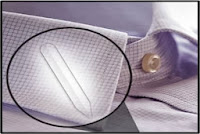Men's Shirt Collars: A Frame for the Face
Collar is the most important element of a dress shirt.
They are the frame for the face. Regardless of the type of suit jacket or tie, ones shirt
collar is always visible, and plays a major role in determining how the
wearer's face will appear to observers. Choosing the right shirt collar will
ensure you enhance your facial strengths while downplaying any irregularities. The
detail of the collar also represents a major part of the quality of a dress
shirt.
Classic Collar (Point Collar)- It is the most common collar style. Longer, more closely set
points tend to draw the eye down towards the tie and away from the face, while
a more moderate cut frames the tie and completes the arrow effect pointing at
the face.
Italian Collar (Cutaway or Spread Collar) - These collars reveal
more of the upper shirt area and leaving additional room for larger tie knots.
Like the classic collar, spread collars come in a variety of widths, with more
moderate ones resembling slightly flared point collars, while more extreme
versions can be nearly horizontal. The particular dimensions are best left to
the wearer's preference and body type, with very wide spreads tending to
accentuate wider figures while creating a more fully proportioned look on thin
gentlemen.
Button Down Collar - It is most often
seen on casual shirts. These collars have small buttonholes at the tip of each
point, corresponding to a small button on each side of the shirtfront. While
this collar can be worn successfully with a tie, it is the least formal of all
the collar choices and is an excellent choice for open collar. The buttons on
the collar, however, are always fastened; to appear with undone collar buttons
would be inappropriate.
Wing Collar
Wing collars – familiar to most as the collar frequently worn with the tuxedo – consists of a short shirt collar with no turndown, and two small "wings" at the front which are tucked behind the bow-tie. Wing collars are reserved for formal wear.
Wing collars – familiar to most as the collar frequently worn with the tuxedo – consists of a short shirt collar with no turndown, and two small "wings" at the front which are tucked behind the bow-tie. Wing collars are reserved for formal wear.
Pin and Tab Collar - Pin collar has small
holes in each point, allowing the insertion of a decorative pin or bar behind
the tie knot, which thrusts the tie knot forward and up while adding extra
decoration to the collar itself. Tab collar employs a small tab extending from
the middle of each point, which is fixed together – usually with a
hook-and-loop closure – behind the tie. Similar to pin collar, this forces the tie
forward and up, creating the "standing" look of more elaborate knots.
Neither the pin or tab collar should be worn without a tie; the empty holes and
flapping tabs present an untidy appearance.
When choosing the collar
of a dress shirt, you need to consider the level of formality; more importantly, how
the collar goes with the shape of your face. Those with narrower faces do better
with slightly shorter collars, while round faces carry well above long collar
points. As a general rule, the greater the angle between the short sides of the
collar points, the more formal the presentation.
The white contrast
collar, in any style, is a favorite of power-dressers, since
it certainly raises a suit-and-tie above the masses.
On most decent dress shirts, the collar's points are kept straight by collar stays. Usually they are made of plastics. These 2- to 3-inch pointed splints are inserted into slots on the underside of the collar.








Hiç yorum yok:
Yorum Gönder